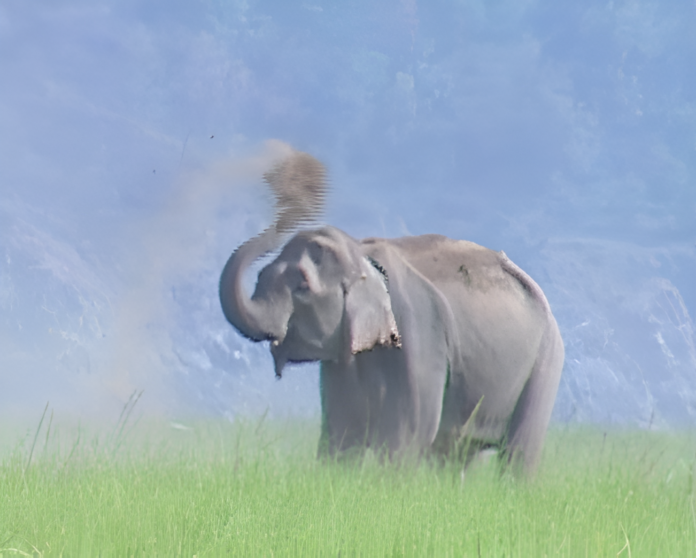The elephants struggle for survival also requires regulating its body temperature and protecting it from sun and parasites. Dust bathing is an important behaviour where the elephant sucks dust into its trunk overhead and blows the dust out over its back.
Dust bathing in elephants is considered important for temperature regulation, protection of the skin from the sun, protection from UV rays and protection from parasites. The sand and gravel particles in soil may act as abrasives and promote the shedding of hard keratinised flakes in the skin.
Heat loss in elephants is achieved through constant fanning of the ears. The extent of heat loss from fanning is matter of debate, with some authors attributing 100% heat loss through the ears while others reporting as less as 8% of total heat reduction. Some authors suggest that a major portion (about 75%) of heat loss in elephants is achieved through the skin with the wrinkled skin holding water and facilitating its movement to the body surface thereby increasing the evaporative cooling effect. Dusting also plays an important role in temperature management. A positive correlation has been established between the maximum the daily temperatures and the amount of time the Asian Elephant dusts itself when the ambient temperature increases beyond 130C. The role of dusting as a thermoregulatory mechanism needs more understanding with some authors of the opinion that since the frequency of dusting is not related to body wait it may have little role in thermo regulation.
Synchronised timing of dusting within groups suggests that it may also be a mechanism to establish social cohesion. Elephants are highly social. Dusting is a community activity that strengthens bonds. It is one of the many lessons taught to the young elephant calves. Dust bathing is an important act in the evolutionary success of elephants over 55 million years. Elephants good at dust bathing are considered healthier and may live longer.
Despite the varying reports, it is generally observed that dusting may help the elephant in skin care, protection from sun, insects and parasites, temperature control and protection from radiation. The frequency of dusting is highest in summers.
©Srimaa Communication
Acknowledgements-Dr. Yashpal Singh, Mrs. Neena Singh, Mr. Rajesh Bedi, Manoj Kumar Yadav
